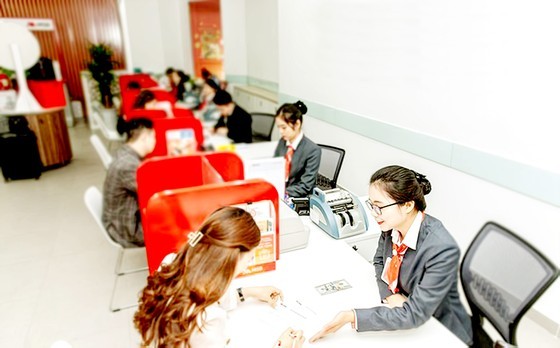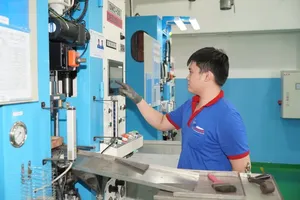 Businesses hungry for capital while banks exhaust credit quotas
Businesses hungry for capital while banks exhaust credit quotas
As of August 15, the economy's credit reached over VND 11.45 million billion, up 9.62 percent, much higher than the same period in 2021 at 6.68 percent. Meanwhile, by the end of June 2022, credit growth increased by 9.35 percent. Thus, within the past 1.5 months, credit increased very slowly at only 0.27 percent showing that commercial banks’ credit room is exhausted.
Many commercial banks said that they had to manage to lend themselves in the remaining credit space, so they could not promote credit growth even though businesses’ demand for capital is huge. Some commercial banks have to buy back corporate bonds and issue debt recovery collections to be able to lend.
However, with the remaining credit room, commercial banks have to consider more carefully, only considering short-term loans with consumer loans from 1-3 months. That is also the reason why many businesses are currently finding it difficult to access bank capital.
For example, many tourism businesses said that after reopening, the tourism industry recovered well, but it was difficult for them to access loans to restart their business. Most small travel agencies do not have collateral to be able to borrow credit packages with preferential interest rates, even if they are in a qualifying industry. As for unsecured loans, after two years of hiatus due to covid-19 travel restrictions, travel businesses had no revenue; thus, they could not prove stable cash flow and good financial statements to get loans.
A leader of Viet Tourism Company said that in order to be able to maintain its operation, this enterprise must borrow capital in the form of short-term personal consumption loans, with an interest rate of more than 10 percent per year. Even in the most difficult times, businesses have to borrow money with the highest interest rate to maintain operations and retain employees because they cannot access bank capital. Although the company is eligible to borrow loans from the 2 percent interest rate support package, the company doesn’t have collateral as per the regulations while collateral is always the biggest problem for enterprises.
Anh Viet Hop on - Hop off Vietnam Company said that it is in need of a loan to invest in more bus fleets to serve tourists to visit the city, but many banks have been running out of credit room. Many other travel companies moaned that capital is currently the lifeline to help businesses recover from the pandemic, but because banks have run out of room, disbursement is quite slow even when companies are eligible for loans.
Previously, only one day after completing the loan procedure, businesses would receive money, but now many loans have to wait 3-5 days to be disbursed, causing the capital reserve of enterprises to increase due to increasing cash reserves; especially travel businesses which are required to pay suppliers and accommodation facilities and advance deposit when booking services for guests.
Not only tourism businesses, an owner of a petroleum business Minh D., said that 2 weeks ago when the loan of VND10 billion with an interest rate of 6.8 percent a year was due, the interest rate was pushed up to 7.2 percent a year, but Mr. D. could only disburse VND 8 billion because the bank said that the credit room was exhausted. Businesspersons in the petroleum field have faced many difficulties in the past time due to sharp and continuous fluctuations in gasoline prices. But when borrowing money, banks not only increased interest rates but also cut off the capital, causing us to bump into difficulties, Mr. D. said.
In the context that interest rates are on an upward trend, many businesses have been eager at the 2 percent interest rate support package from the State budget for loans to enterprises, cooperatives, and business households from May 2022. However, until now, after nearly three months of implementation, not many businesses have access to this support package. The quick report data from commercial banks and the State Bank shows that, up to now, nearly 550 businesses have borrowed nearly VND 4,100 billion from the package of VND 40,000 billion with 2 percent interest rate support for businesses, cooperatives and business households.
The State Bank explained the slow implementation of the policy that commercial banks are difficult in determining those who are eligible for the support package with preferential interest rate. Many production and business households do not register as business households, so they are not eligible for support.
Many businesses, especially small and medium-sized enterprises, say that it is difficult to access the interest rate support loan package because banks require new loans to repay old debts and have collateral. But in the past two years of the epidemic, most businesses have their property mortgaged at banks, and no more assets for new loans.
Meanwhile, explaining to businesses, many commercial banks said that because this is a support package from the budget, the appraisal and approval of documents require carefulness to ensure that the capital flows to the right businesses. However, many commercial banks also unearthed that they have not had a credit room.
According to many experts, the potential for credit growth is still quite large with about 4.42 percent, equivalent to nearly VND 500,000 billion in the last four months of the year. Therefore, the State Bank should soon adjust the credit room for banks; otherwise, it will delay the bank's lending capacity. As a result, not only do commercial banks have difficulty in doing business, but the production and business activities of enterprises are equally difficult.
Without loosening the room, the interest rate support can only be applied to old loans, production and business activities will continue to face difficulties and will not create new motivations for enterprises.
























